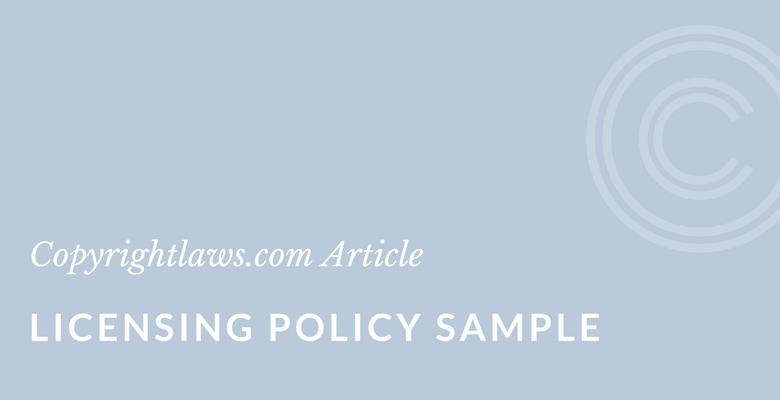A licensing policy is a helpful document for a library or organization that licenses electronic resources or e-resources. This article is written by Lesley Ellen Harris, author of Licensing Digital Content, 3rd edition.
Copyright and Intellectual Property Policies are more common than licensing policies for e-resources. However, a written licensing policy is useful for any organization that licenses electronic resources such as:
- Online journals and periodicals
- Electronic databases
- Image archives
Explore these questions to determine if a licensing policy would be helpful to your organization...
- Could it encourage more consistent licenses?
- Will it act as an educational document for librarians and end users about how licensing works?
- Can it guide you toward better license negotiations?
- Can it set out permissible text and data mining provisions in your licenses?
We provide a sample licensing policy below. It is reproduced, with permission, from the third edition of Licensing Digital Content: A Practical Guide for Librarians.
Whether you're new to licensing digital content or would like to learn more about this area,
our fully online Certificate in Licensing Digital Content will help you
expand your knowledge, decrease your risk of license violations,
find practical solutions to your day-to-day issues, and more. Check it out!
LICENSING POLICY FOR ABC LIBRARY OF XYZ ORGANIZATION
I. Purpose of Policy
The purpose of this policy is to educate ABC Library staff about licensing basics and to provide a consistent procedure for licensing content for the library or organization. It is not intended to act as a substitute for legal advice, and proper legal advice should be obtained when necessary.
II. What Is a License Agreement?
A license agreement is a written contract, a legal document, between a user and an information provider that sets out the terms and conditions under which a user can use digital content. As an information provider (creator, publisher or vendor), you require a license agreement whenever someone else wants to use your content. As a user of digital content, you need a license agreement whenever you use the content of others.
For example, if the library or other department wishes to use a photograph or newsletter article on its own or the organization’s website, the library must enter into a license agreement with the photographer or writer (or perhaps their employer if they own the rights) to do so. A license agreement is necessary, for example, for accessing online journals and electronic databases. The licensor is the information provider and the licensee is the library or organization obtaining access to electronic content.
III. Basics of License Agreements
As license agreements are legal contracts, it is important to understand the basics of contract law. A contract sets out the relationship between the parties, the licensor and licensee, and can help avoid future conflict. It sets out the rights and obligations of each party.
Contract Components
A valid contract has the following three components:
- An offer to do something or refrain from doing something
- Acceptance of the offer
- Consideration
Customary Clauses in License Agreements
License agreements are open to considerable creativity by the parties involved. They are negotiable and the licensor and licensee must come to terms with a relationship that benefits each of them. However, it is important that a license agreement contain the following basic clauses:
Parties to the contract. A license agreement should state the legal names and addresses of the parties who are subject to the agreement.
Purpose of the contract. The purpose of the license agreement should be set forth. For example, to license software, photographs, or a database.
Rights and obligations of each party. The rights and obligations of each party should be set out in the license agreement. For example, the photographer is to provide the library with a high-quality version of the photo for the library to include on its website, while the library must ensure that only library patrons are allowed to view the photograph. In another example, a database vendor may provide on its server or on DVD the requested electronic database for library staff and patrons to access on the premises of the library and possibly remotely.
Usage of content. The license agreement should set forth how content can be used and how long it can be used. For example, a photograph may only be used on the library’s website for a period of one year, or an online journal may be accessed for one year on the premises of the library or through the library’s or organization’s server from anywhere in the world.
Compensation. This clause sets out how much compensation will be provided to the content provider for use of the licensed materials. It may also set out the currency, any relevant taxes, and the basis of payment.
Copyright ownership. The agreement should discuss ownership of copyright. For example, an author retains ownership in software or a database and only licenses this content to the library or organization.
Warranties and indemnities. Warranties in a license agreement set out promises that parties have made. For example, the content owner warrants that he is the owner of the content he is licensing to the library. Coupled with this warranty is an indemnity clause which sets out that should the warranties not be upheld, that the licensor or licensee will compensate the party for any resulting expenses due to the broken warranties.
The license agreement may have several general provisions relating to such things as applicable law, arbitration, and so on. The library’s or organization’s lawyer will be of assistance in ensuring that license-specific and general provisions protect the interests of the library and comply with any institutional policies.
IV. How to License Content at ABC Library
Below is an overview on how content is generally licensed at the ABC Library and XYZ Organization. Consult Frances Cohen, Electronic Resource Librarian, frances@abclibrary.com, tel. 202.xxx.xxxx, prior to licensing any content for our library.
If you wish to use content that the library or the XYZ Organization does not own, or if another party wishes to use content that the library or XYZ Organization owns, a license agreement must be entered into. If you are provided with a license for the use of digital content that seems to be complete and not subject to negotiation, the first question you must ask the supplier of that content is whether the license is negotiable. Even if the content owner says that the license is not negotiable, if there are terms and conditions in the license that do not work for the library or our organization, try to amend these clauses. Often, even apparently nonnegotiable licenses are negotiable.
Before negotiating a license agreement, it is important to first determine whether we have entered into a similar license agreement. This can be done by looking at the ABC Library Licensing Binder (also available on our intranet), which has categorized all of our organization’s license agreements by subject area (i.e., website, software, journals, periodicals, database, etc.) as well as by name of the publisher or other information provider. It is also worth double-checking to make sure the license does not conflict or overlap with existing licenses, including ones to which our library is bound through a consortium.
If you find that similar content has been licensed in a previous license, examine the clauses in that other agreement, and find out if any of the clauses were problematic for the parties involved. For example, did the library run into problems with usage restrictions imposed by the content owner that prevented patrons from accessing licensed material? If the similar content was not covered in a previous contract, then look at other agreements in the binder or on our intranet to see if the arrangements between the parties are similar to the type of arrangement you wish to have. Determine how this new situation differs from previous arrangements and if there were any problems in the past that you can avoid this time.
Write down the basics that you wish to have covered by your new license agreement. Make sure that you speak with the library’s or our organization’s lawyer [who may or may not have experience in copyright law], the acquisitions librarian, the budget office, purchasing department, and the reference librarian. Before developing any kind of license agreement, it is important to talk to a copyright lawyer [who may or may not be the same person as your library’s or organization’s lawyer]. You can discuss what sorts of clauses did not work in past license agreements and get an idea of how to resolve these problems in the future.
It is important to remember that license agreements will differ and will need to be adapted to meet the changing needs of the library or organization. Before signing a license agreement, review its wording carefully to ensure that you know what it means, and consult our copyright lawyer to ensure that you are clear on its meaning. Remember that you may not be authorized to sign an agreement on our library’s or organization’s behalf and you may need to seek the authorized person to do so.
V. Frequently Asked Questions
[The “frequently asked questions” section of the policy should set out questions that arise from each licensing arrangement.]
Updated February 1, 2023
Share Your Licensing Policy
A policy is only effective when your audience is aware of the policy. Below are five tips for making sure your policy is read by your audience.
- Post your licensing policy on your website or intranet. Send an email to your colleagues informing them about this new or updated policy.
- Hold an in-person or virtual question period where you can briefly explain your licensing policy and also answer questions about it.
- Prepare a short video (you could use your smartphone) explaining highlights of your licensing policy.
- Organize a short workshop (one or two hours) where you explain and review the licensing policy.
- When a colleague asks a question about licensing, take the opportunity of a teachable moment to share information about the licensing policy.
To learn more about licensing digital content, see our three-part course Certificate in Licensing Digital Content. It covers licensing terminology, typical licensing clauses, and how to negotiate licenses and legally use licensed electronic resources. See the testimonial below.





